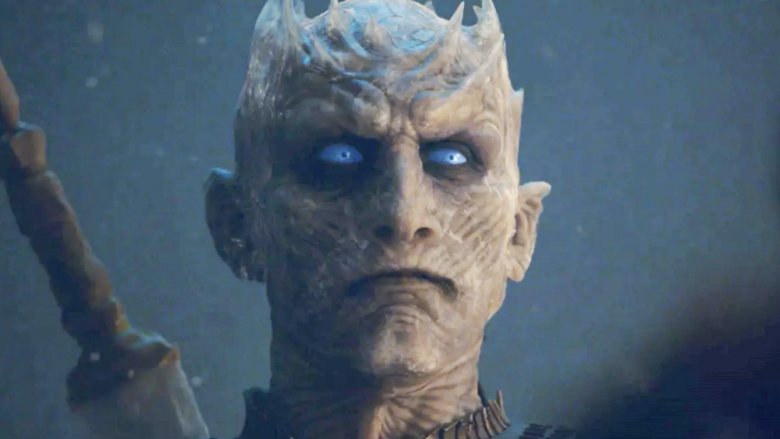The Night King Question No One Is Asking After The Big Battle
Contains spoilers for Game of Thrones season 8, episode 3, "The Long Night"
When it comes to Game of Thrones, certain episodes leave us with more questions than they answer. The most recent installment of the fantasy epic's final season, "The Long Night," cleared up a massive uncertainty fans have had since the very beginning of the series: how will the Night King and his Army of Dead be defeated, and who will carry out the act? But just because Thrones revealed Arya Stark (Maisie Williams) to be the Night King-killer, slaying him during the Battle of Winterfell, doesn't mean queries stopped there. In fact, there's a huge question that no one seems to be asking after the series' latest episode.
It's simple, but a real head-scratcher: Why didn't the Night King die by fire? During the previous episode, dragonfire is posited to be one of only three ways to kill a White Walker, along with dragonglass and Valyrian steel — so why was the Night King not sent to his maker when Daenerys Targaryen called on Drogon to light the frosted villain aflame?
Game of Thrones expert and professional Thrones tutor Christopher Williams of Varsity Tutors has the explanation.
Speaking with PureWow, Williams detailed that the Night King survived the onslaught of fire and fury from the Mother of Dragons because the two entities are "polar opposites" and their powers essentially cancel one another out.
"It was sort of an ice beats fire kind of thing. They're [the Night King's ice power and Dany's fire] two polar opposites, so they can't really be killed by each other," said Williams. As PureWow noted, this is explanation is similar to the one that answers why Voldemort wasn't able to kill Harry Potter (Daniel Radcliffe): their powers nullify one another.
Williams continued, noting that only one single person could defeat the Night King. Drogon isn't able to murder the Night King out of his own volition, as he follows orders from Daenerys, which offers an additional explanation as to why the Night King was immune to fire. Not only do the Night King's icy abilities cancel out Drogon's fiery breath, but the fact that technically two attackers (Drogon and his master Dany) attempted to take his life also means that the attempts to murder the Night King by fire were completely futile. According to Williams, that method was simply never going to work.
"I figured that [Dany, Drogon and the Night King] couldn't kill each other. His destruction had to be come from someone with self-will to choose for themselves what to do," he stated.
If the Night King had lived through the Battle of Winterfell, his immunity to fire would spell trouble for the people of Westeros, as the Dragon Queen's most powerful weapon of defense and offense ("hey, I'm the only person in the known world who has dragons!") would be useless against him. Luckily for literally everyone in the country, Arya took the tried and true route of killing a White Walker when she stabbed the Night King with her catspaw dagger made from Valyrian steel, using the same method her brother-who's-really-her-cousin Jon Snow (Kit Harington) did when he brought down a White Walker with his Valyrian steel sword Longclaw on season 5.
In that moment, the Stark woman ended the Long Night and the side of the living won the Great War — but the battle isn't over yet. The Last War has just begun, and the North is about to make a move on King's Landing in efforts of dethroning the Mad Queen Cersei Lannister (Lena Headey) from her iron seat. Or, as Daenerys put it in the teaser for the upcoming episode of Game of Thrones, "rip her out root and stem."
Many, including Williams, speculate that Arya's work isn't done and that she'll play a pivotal role in what's to come on Thrones. Word amongst fans is that the Night King actually the penultimate Arya victim this season — and that Cersei herself will suffer the same consequence the Night King did once Arya crosses her path. While some believe that Arya's personal character arc was meant to end with killing the Night King, shutting the blue eyes that Melisandre (Carice van Houten) prophesied she would, others are of the opinion that murdering Cersei and sealing her emerald-colored eyes forever is Arya's ultimate goal.
As Williams said, "She has the will to continue the fight and to be brave. She's been broken down to nothing and now she's something. She's got a purpose and she's definitely got a goal. I don't think the Night King was a part of that agenda. It was kinda like an on the fly decision. But I think tactically she's been working toward killing Cersei."
Now that the Night King and his savage hirelings have been vanquished, Arya can shift her attention to helping bring the fight for the Iron Throne to a final end. How she might do that is a mystery for now, but a girl has only a few names left on her infamous list, so a girl very well might get even more murder-y on the next episode of Game of Thrones.
The series takes the Starks and the survivors of the Battle of Winterfell down to King's Landing in what's bound to be a mind-blowing episode this Sunday. Tune in when Game of Thrones returns on May 5 at 9 PM ET on HBO.
